
NEWS ARTICLES
STB CRAFTS THE SOCIAL TECHNOLOGY AGENDA FOR THE NEXT SIX YEARS
By: Azalea Denise L. Aporado
Posted on Feb 6, 2023 by the Promotion and Institutionalization Division
The Social Technology Bureau (STB) successfully conducted a series of activities for the development of the new Social Technology (ST) Agenda for the years 2023 to 2028. The ST Agenda provides the roadmap for innovating solutions to identified social welfare and development gaps, emerging needs and trends, and social issues including those arising from the COVID-19 pandemic situation.
From April to June 2022, the Bureau facilitated four (4) consultation activities in Luzon, Visayas, Mindanao, and Bangsamoro Autonomous Region in Muslim Mindanao (BARMM). The activities were participated by the STB, Field Offices (Social Technology Unit, Planning Officers, and Sectoral Focals), Local Government Units (LGU), Non-Government Organizations (NGOs) with experience working at the community level, and members of the academe with experience in project assessments, analysis, and research.
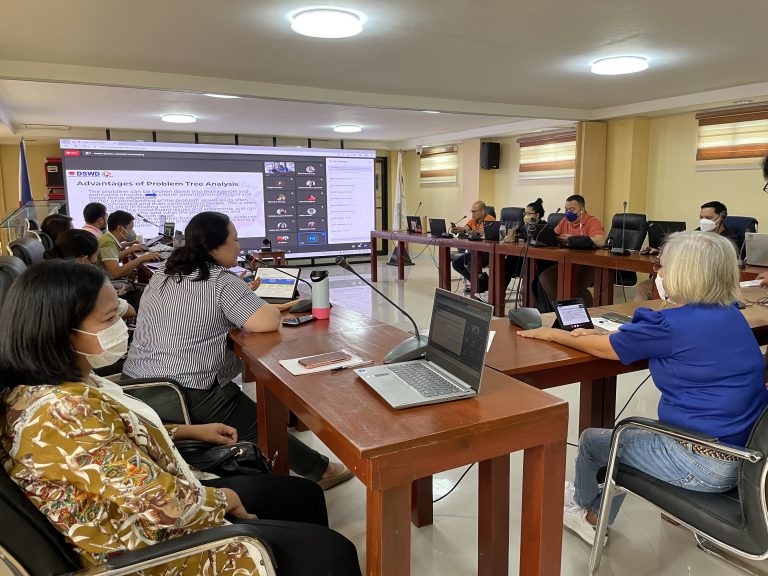
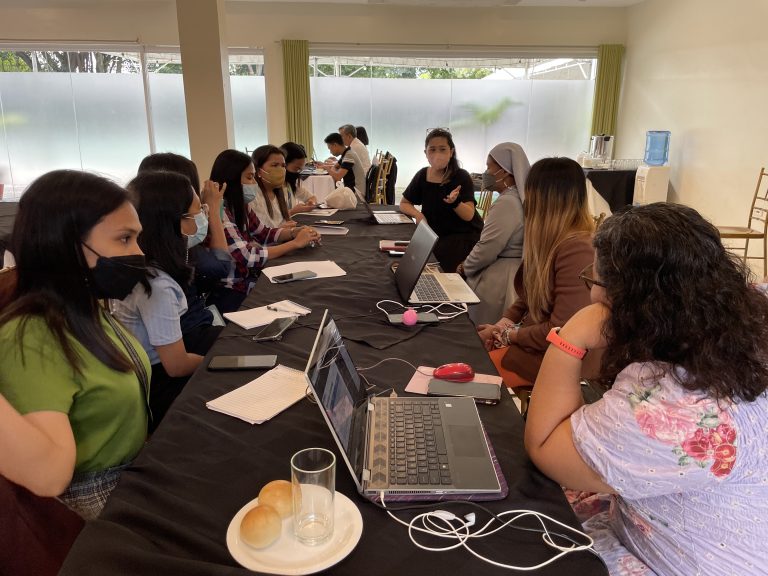
The consultation activities ushered the bureau and stakeholders towards determining emerging social welfare and development issues or concerns, as well as envisioning desired positive situations vis-a-vis the identified problems.
During the consultation activities, the participants were updated about the Department’s Refreshed Strategy 2028. Resource persons were tapped to present the national and local situationer per sector. The participants attended various workshops corresponding to the stages of problem analysis. Some of the issues commonly identified in all three (3) consultations were the increasing number of Violence Against Women and their Children (VAWC) cases, the high incidence of children at risk, the high incidence of unemployed/underemployed individuals, and the increasing number of solo parents who experienced difficulty in raising children to provide basic needs.
Workshop participants shared their takeaways and impressions of the consultation activities. Some of them expressed that the activity served as a refresher course on the process of problem analysis. While others shared that the inputs and information from the workshop are helpful to provide services for their clientele. On August to September 2022, the Social Technology Units convened once again for a National Idea Workshop to help the bureau determine the scope of the ST Agenda and the strategies to be taken in response to the identified issues. Through the activity, participants proposed an intervention for the identified issues. The proposed interventions were considered in a multi-year work plan that captures projects for each phase of the social technology development namely analysis, designing, pilot testing, evaluation, promotion, and institutionalization.
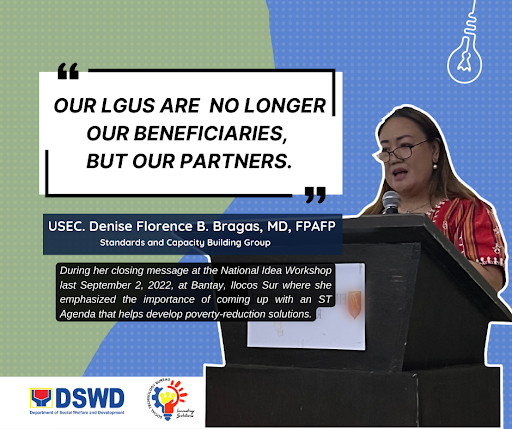
To formally cap off the activity, Usec. Denise Florence B. Bragas of the Standards and Capacity Building Group delivered her closing message focusing on the importance of coming up with an ST Agenda as contribution to the mandate and commitment of the Department. Usec. Bragas highlighted that the outputs gained in the workshop will provide a sharper focus on our efforts to develop, implement, and coordinate social protection and poverty-reduction solutions for and with the poor, vulnerable and disadvantaged.
The Bureau has conducted meetings and a validation workshop to discuss, process, and incorporate the results of the preparatory activities to the ST Agenda, while also considering the current Administration’s priorities and the Department’s commitments as stated under enacted laws. Among the proposed priority issues and concerns for the year 2023, are the increasing numbers of adolescent mothers and children at risk, the increase in reported cases of violence against women and children, and the difficulties experienced by solo parents in raising their children.
###
STB HIGHLIGHTS DIGITALIZATION AND CHAMPIONS IMPROVING LIVES OF FILIPINOS IN THE
SOCIAL TECHNOLOGY EXPO 2022
By: Jhann Paul V. Cornel
Posted on Feb 6, 2023 by the Promotion and Institutionalization Division
The Department of Social Welfare and Development through its Social Technology Bureau (STB) conducted the 2022 Social Technology Expo at the Hive Hotel & Convention Place, Quezon City, Metro Manila on 20 December 2022. Spearheaded by the Promotion & Institutionalization Division, the 2022 ST Expo was the culmination of hard work, perseverance, and dedication to providing relevant, effective, efficient and sustainable Social Technologies.
This year’s ST Expo was launched with the theme “STB Goes Digital: Improving Lives of the Filipinos through Social Technologies”. The said event was a monumental step for the Bureau in intensifying its efforts to institutionalize and promote the completed and enhanced Social Technologies (STs) among Local Government Units (LGUs) and intermediaries.
The ST Expo showcased the animated videos of the five completed STs from 2019-2022. These completed STs are namely: a) Buklod Paglaom Para sa CICL, b) Comprehensive Program for Children, Families and Indigenous Peoples in Street Situations, c) Yakap Bayan Program for Recovering Persons who Used Drugs, d) Strategic Help Desks for Information, Education, Livelihood, and other Developmental Interventions Against Child Labor (SHIELD), and e) Wireless Mental Health and Psychosocial Support for Individuals and Families in Crisis Situations (WiSUPPORT). Partners from pilot areas shared the results of the pilot implementation, including the learning and success stories
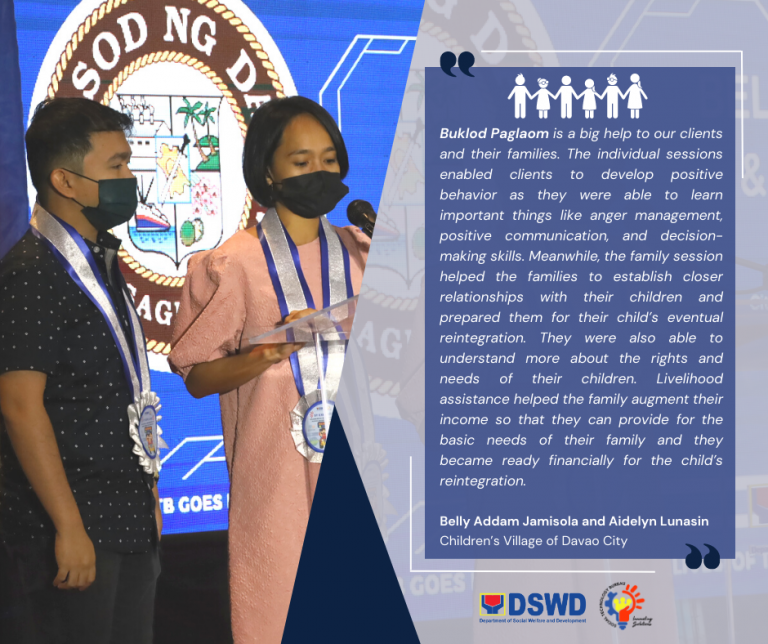
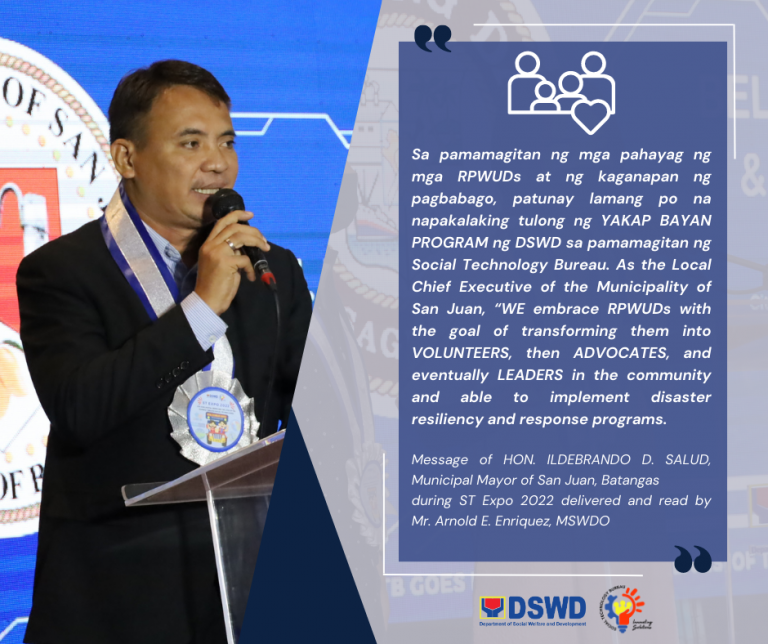
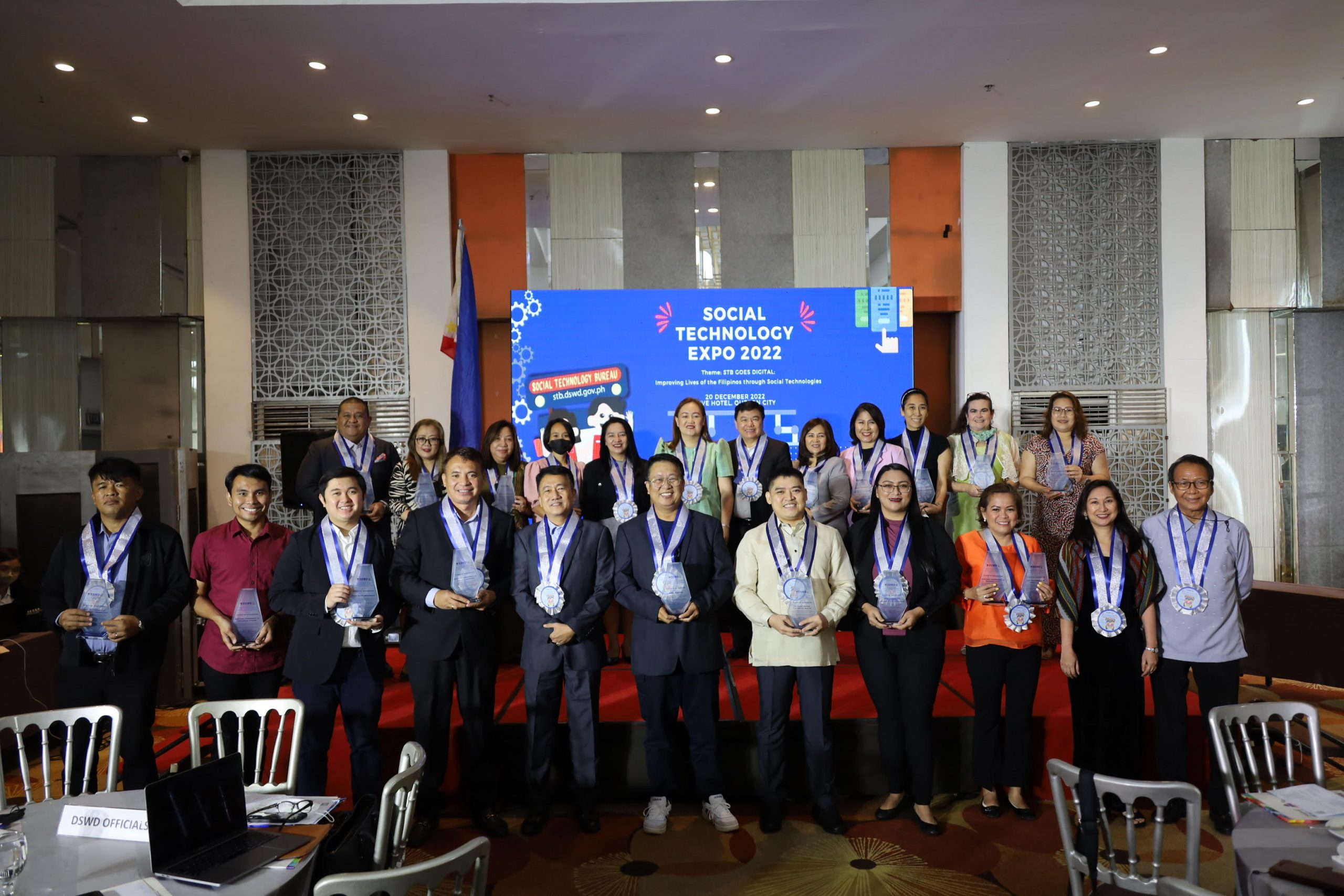
The STB Website and E-Learning Courses were also launched during the ST Expo. The website boasts the capability of having the wide-range information of the bureau including the Completed Social Technologies that are for replication up to this date. Consequently, the STB website is also the home of the newly-launched E-Learning System which should reach its full functionality by the first quarter of 2023. To know more about the STB Website and the E-Learning Courses, you can watch this video played during the ST Expo through this link:
The Expo was graced with one hundred and fifty attendees. Various officials and intermediaries were recognized during the Awarding & Recognition for their exemplary contribution to the achievement of these completed Social Technologies:
DEVELOPMENTAL / CSO PARTNERS that provided technical support and resource augmentation for ST development and provided strong support for advocacy and lobbying for the institutionalization of STs:
* United Registered Social Workers (URSW)
* Mental Health AWhereNess
* International Labor Organization (ILO)
* Ban Toxics
* United States Agency for International Development (USAID)
* United Nations Office on Drugs and Crime (UNODC)
* Association of Local Social Welfare and Development Officers of the Philippines (ALSWDOPI)
NATIONAL AGENCIES that provided technical support and resource augmentation for ST development. Replicated and/or enacted resolution institutionalizing the ST covering the areas of their jurisdiction. Support for advocacy and lobbying for the institutionalization of STs:
* Juvenile Justice and Welfare Council (JJWC)
* Council for the Welfare of Children (CWC)
* National Center for Mental Health (NCMH)
* Bureau of Workers with Special Concerns, Department of Labor and Employment (BWSC, DOLE)
LOCAL GOVERNMENT UNITS (LGUs) Enacted a local policy adopting the STs in their locality. Provided human resource logistical, and/or the implementation and/or sustainability of the STs. Sustained the implementation of the STs in the pilot areas.
* Davao City, Davao del Sur
* Cabanatuan City, Isabela
* Zamboanga City, Zamboanga del Sur
* Ormoc City, Leyte
* Jose Panganiban, Camarines Norte
* Catanauan, Quezon
* Kananga, Leyte
Presently, there are already 26 completed Social Technologies catering to all sectors that address and respond to the emerging needs of the vulnerable and disadvantaged. The work is surely not yet done. The Social Technology Bureau will continue to develop more social technologies, carry out its benevolent mandate and provide the much-needed support in improving the lives of our fellow Filipinos.
Sulong Tayo, Bayan!
# # #
NATIONAL GOVERNMENT AGENCIES, LOCAL GOVERNMENT UNITS, AND CIVIL SOCIETY ORGANIZATIONS BRING TOGETHER PROGRAMS FOR CHILDREN, FAMILIES, AND IPS IN STREET SITUATIONS
By: Camille Anne Francisco-Taguba & Cherie D. Alfiler
Posted on Feb 6, 2023 by the Promotion and Institutionalization Division
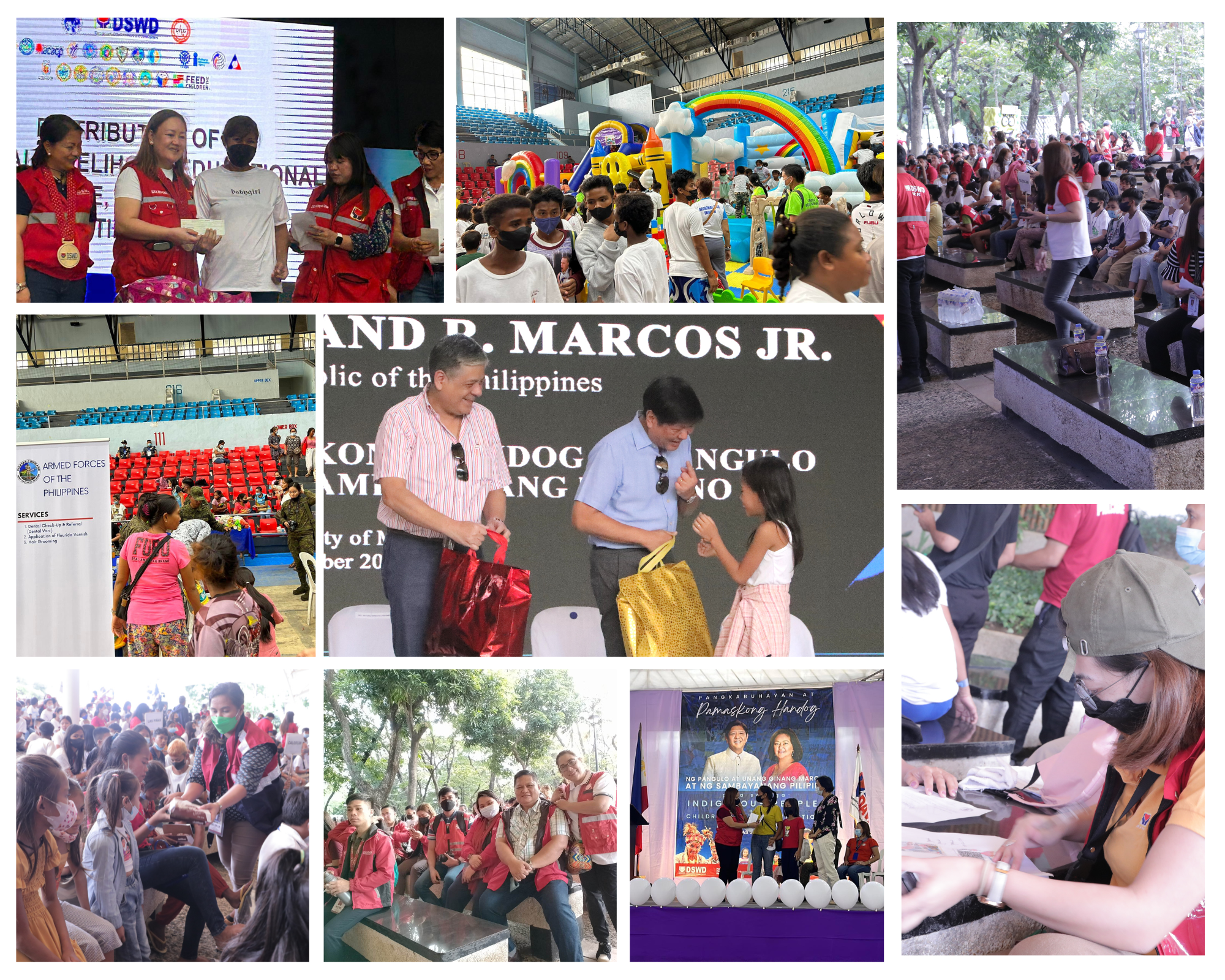
The Department of Social Welfare and Development (DSWD), in collaboration with the Field Offices, specifically, Regions VII, XI, and NCR worked with other line agencies, (e.g., Department of Health (DOH), Department of Labor and Employment (DOLE), National Commission on Indigenous Peoples (NCIP), Armed Forces of the Philippines (AFP), Commission on Population and Development (PopCom), Technical Education and Skills Development Authority (TESDA), Public Attorney’s Office (PAO), Commission on Human Rights (CHR), and the Philippine Statistics Authority (PSA) during the Caravan of Special Protection Programs for Children, families, and IPs in street situations.
The Caravan was conducted on 21, 22 and 23 December 2022 at the Hoops Dome, Lapu-Lapu City, Cebu, Rizal Park Open-Air Auditorium, Manila, Almendras Gym, Davao City, respectively. The CARAVAN is the national and local government’s effort to ensure that children, their families, and IPs are reached by protective services during the yuletide season through relevant and timely interventions from the government. A total of 960 children and 1,032 family heads who are beneficiaries of the DSWD’s Comprehensive Program for Children, Families, and Indigenous People in Street Situations were provided with assistance during the three (3) batches of the caravan. The program has been implemented since 2012 to provide a package of services to the identified beneficiaries.
Inter-Agency Convergence felt in Cebu City
DSWD Officials, led by Undersecretary Denise Florence B. Bragas, Undersecretary Sally P. Navarro, Assistant Secretary Ma. Evelyn B. Macapobre and Assistant Secretary Irene B. Dumlao distributed hygiene kits, homelife kits, Noche Buena packs, educational and livelihood assistance, and school kits to 300 family heads and 200 children. They also availed of medical and dental checkups, vaccination, national ID registration and hair grooming, and participated in the jobs fair.
During the activity, twenty-two year old Carla Mae Telmo also shared her testimony as she graduated and passed the Nursing Examination. Ms. Telmo is a descendant of the Sama-Bajau tribe in Barangay Totolan, Dauis, Bohol. Her family is a beneficiary of the Pantawid Pamilyang Pilipino Program and grantees of some components of the Comprehensive Program for Children, Families and IPs in Street Situations.
The new administration called the agencies to create programs that will bring the government closer to the vulnerable sectors, and agencies that responded to the call include the Department of Health, Department of Labor and Employment, Department of Education, Technical Education and Skills Development Authority, National Commission on Indigenous Peoples, Commission on Population and Development, Armed Forces of the Philippines, and the Philippine Statistics Authority. Civil society organizations (CSOs) like the Ramon Aboitiz Foundation Inc. (RAFI) and Feed the Children also supported the activity.
President Bongbong Marcos hands over Pangkabuhayan Assistance for the families and Pamaskong Gift Packs for the children
In Luneta, President Bongbong Marcos graced the activity, and in front of 1,000 participants, he said, “I thank the initiative and program of the DSWD and we will think of how the government can help you more. Everyone should feel and experience the Christmas Spirit. I encourage and yearn for the different government agencies to work together, collaborate and work more for the benefit of the children, the families, and IPs who are with fewer opportunities in their communities.”
Astonished with the said grants and gifts, Mrs. Ramonita Cubalan of Mandaluyong, 29 years old and mother of 6 children and whose husband is a street garbage dealer/scavenger, with teary eyes, said, “I am so thankful to the President and to the DSWD because I could not believe that we received these Christmas Gifts”. She added that surprisingly, she and her family were included as one of the beneficiaries of the COMPRE Program.
The Philippine Statistics Authority also provided civil registration and PhilSys National ID Registration to the attendees. This will ensure that the children, families, and Indigenous Peoples access their right to a name and nationality, and enable them to become eligible for government programs and services.
Davao City caps off the 3-day Caravan with the provision of support service interventions
In spite of the absence of flights going to Davao City due to the Christmas holidays, Undersecretary Denise Florence B. Bragas sent an online message to the more than 300 children, 100 family heads and 58 Sama-Bajau attendees during the Davao City Caravan. She greeted the families a warm Christmas blessings and assured them, “Patuloy po kaming tutugon sa inyong mga pangangailangan at magbibigay ng proteksyon sa kapakanan ng mga bata, pamilya, at mga indigenous peoples” (DSWD will continue to respond to your needs and ensure protection and welfare for the children, families and IPs).
During the Caravan, Ms. Evadyne May J. Dela Cerna, former street facilitator of the Comprehensive Program shared her experience in working with the DSWD in responding to the needs of children and families in street situations. She also highlighted the need to conduct profiling, assessing their needs, and partnership-building to ensure right-based, participatory services for the children. Further, she stressed the importance of helping the children return to their schooling by providing them with educational support services and access to scholarships in order to become more productive members of the community.
The success of the Davao Caravan was achieved through the convergence of efforts of the DSWD, the Davao City Social Welfare and Development Office, the 10th Infantry Division of the Philippine Army, the Philippine Statistics Authority, the Public Attorney’s Office, Commission on Human Rights and the City Civil Registrar’s Office.
–
The DSWD continues to work in ensuring holistic, sustainable, and long-term interventions for children, families, and Indigenous Peoples, through the cooperation and collaboration of the national and local governments, civil society organizations, private organizations, and the general public. Presently, a guideline is being circulated among National Government Agencies to call for a whole-of-nation approach and rights-based, culture-based, and child-friendly approaches when responding to the risks and vulnerabilities of children and families in street situations.
Maagap at mapagkalingang Serbisyo!
#BawatBuhayMahalagaSaDSWD
FEATURED STORIES
SOCIAL WORK PRACTICE WITHOUT BORDERS FOR SAMA-BAJAU IN STREET SITUATIONS
By: Elma Salamat
Photos: LGU Cabanatuan
Posted on Feb 6, 2023 by the Promotion and Institutionalization Division
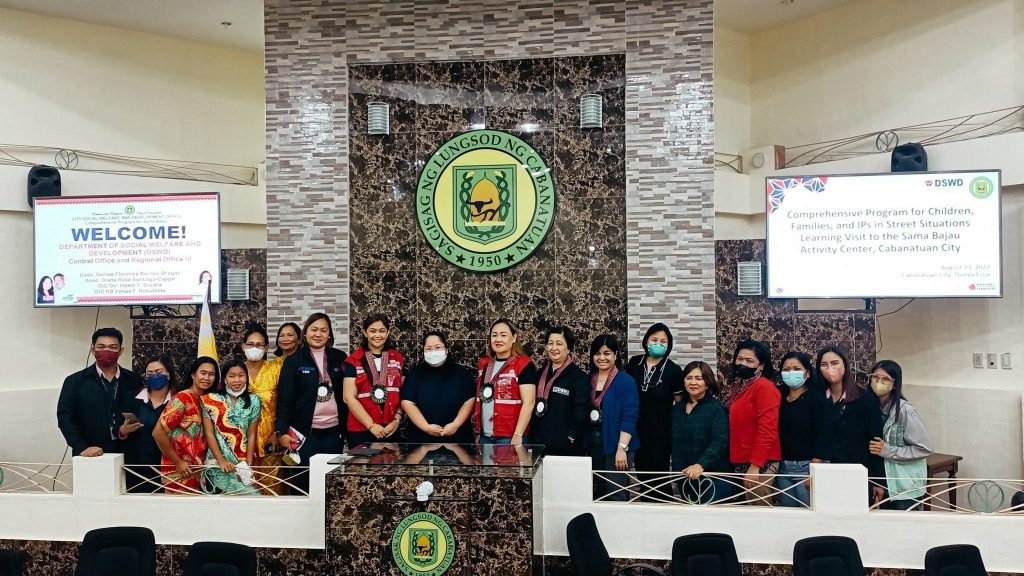
The DSWD team from the Standards and Capacity Building Group (SCBG) headed by Undersecretary Denise Florence B. Bragas, MD, FPAFP, and (former) Assistant Secretary Diana Rose S. Cajipe, MD, FPOGS, together with the Social Technology Bureau, Ms. Helen Y. Suzara and DSWD Field Office III, Ms. Venus F. Rebulda and other DSWD technical staff visited the LGU of Cabanatuan City to know the status of the implementation of the Comprehensive Program for Street Children, Street Families, IPs, especially Sama-Bajau now termed as Comprehensive Program for Children, Families, and IPs in Street Situations.
The Comprehensive Program for Children, Families, and IPs in Street Situations is one of the social welfare and development (SWD) Models of Interventions developed by STB aimed to reduce the risks and vulnerabilities of Sama-Bajau Families in Street Situations through provision of package of support services such as housing, livelihood, educational, medical, and most especially capacity building of service providers and Sama-Bajau on culture-based learning modules. The services are jointly provided by DSWD and LGU Cabanatuan City and other stakeholders. The DSWD Officials and Staff were welcomed by the City Government of Cabanatuan headed by Mayor Myca Elizabeth R. Vergara and City Social Welfare and Development Office (CSWDO) Chief, Ms. Helen Bagasao. Consequently, Ms. Bagasao conducted an orientation on how the LGU implemented and sustained the aforesaid program. She explained that the program was implemented wayback Calendar Year 2012 when the DSWD and Cabanatuan City entered into a Memorandum of Agreement (MOA) as one of the pilot LGUs. The pilot testing ended in CY 2015, from then on, the Cabanatuan City sustained the program by allocating funds in their Annual Investment Plan (AIP). Ten years after, the CSWDO recorded several milestones in the implementation of the Compre Program including but not limited to: reduction of street begging activities of Sama-Bajau; increase number of Sama-Bajau children enrolled in formal schools from Day Care, Elementary, and High School; decrease number of disaster affected families, because the said clan were transferred to a liveable location with sturdy houses; and better health outcomes of Sama-Bajaus as they were provided with free health services.
Ms. Bagasao emphasized that the secret to the sustainability of the Comprehensive Program for Children, Families, and IPs in Street Situations is the commitment and passion of the LGU Social Workers like her to serve the poor, marginalized, and disadvantaged sectors without borders. Through her leadership, the Cabanatuan CSWDO Social Workers have treated and helped the displaced Sama-Bajau equally like other Cabanatueños. She shared the unwavering support of then Mayor Cesar Julius Vergara, who embraced Sama-Bajaus as qualified residents of Cabanatuan City and provided appropriate funds for the Compre Program. Mayor Vergara purchased more than a hectare of land for the permanent houses of more than hundred Sama-Bajau families and construction of Sama-Bajau Activity Center that served as a learning venue for children and adults.
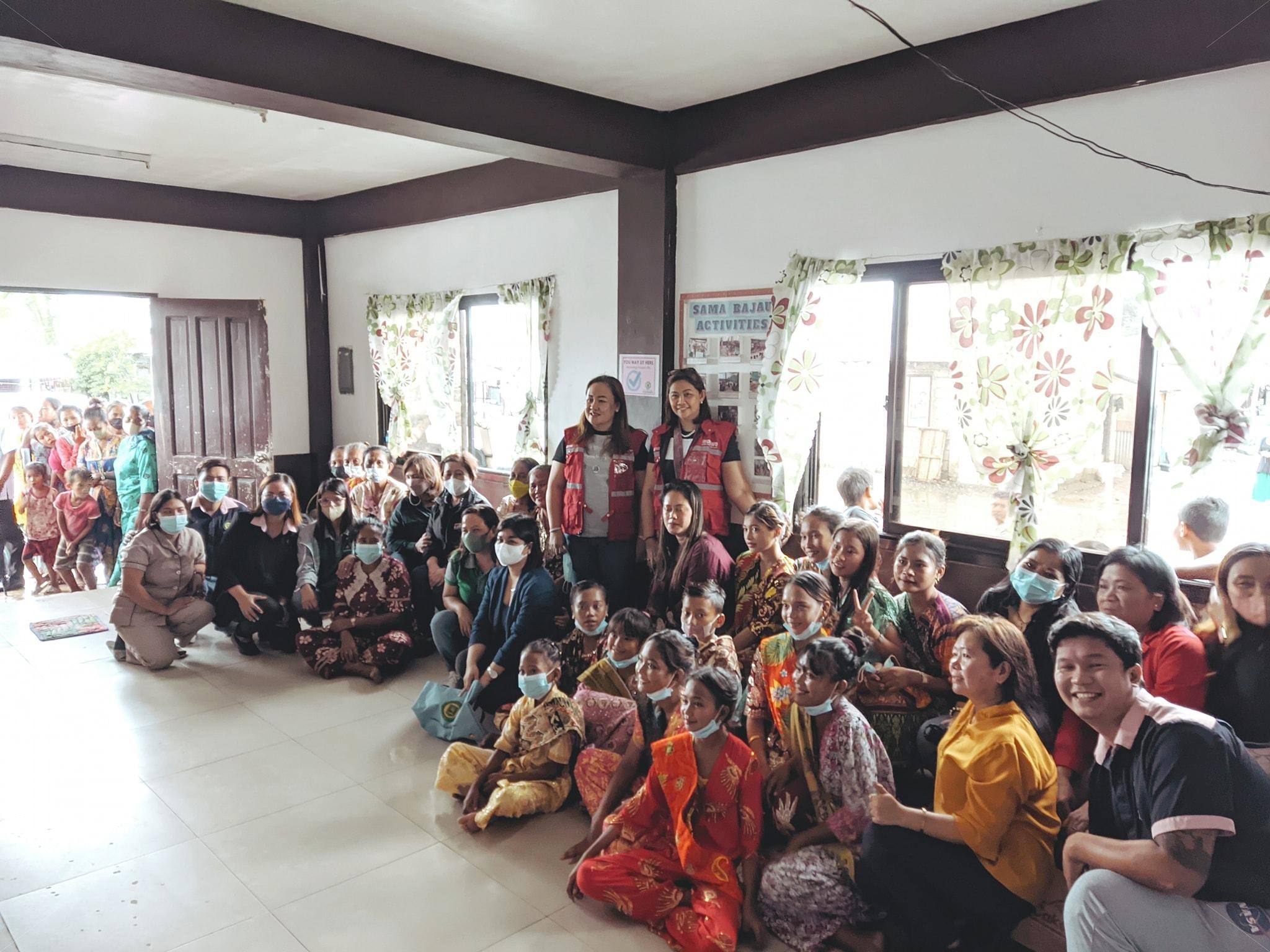
Accordingly, the City Government of Cabanatuan and CSWDO are grateful and honored to have been chosen for the learning visit. The CSWDO will continue to improve the Comprehensive Program for Children, Families, and IPs in Street Situations and other protective, rehabilitative, and developmental services for the constituents of Cabanatuan City.
###
